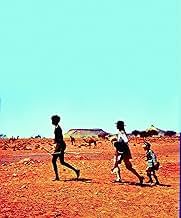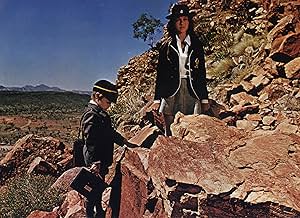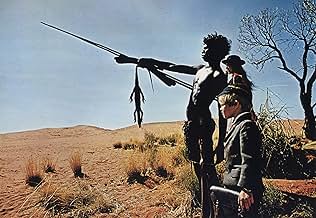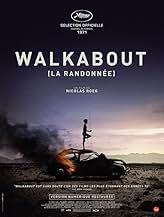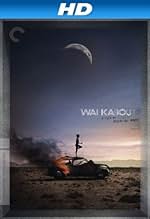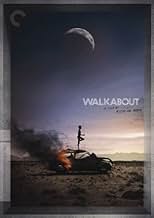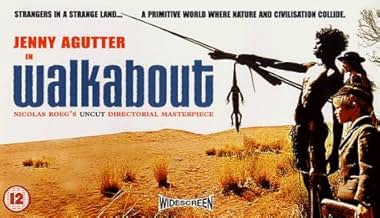अपनी भाषा में प्लॉट जोड़ेंTwo city-bred siblings are stranded in the Australian Outback, where they learn to survive with the aid of an Aboriginal boy on his "walkabout": a ritual separation from his tribe.Two city-bred siblings are stranded in the Australian Outback, where they learn to survive with the aid of an Aboriginal boy on his "walkabout": a ritual separation from his tribe.Two city-bred siblings are stranded in the Australian Outback, where they learn to survive with the aid of an Aboriginal boy on his "walkabout": a ritual separation from his tribe.
- निर्देशक
- लेखक
- स्टार
- पुरस्कार
- 1 जीत और कुल 1 नामांकन
- Black Boy
- (as David Gumpilil)
- Man
- (as Robert McDara)
- No Hoper
- (as Pete Carver)
- German Scientist
- (as Noelene Brown)
- Radio Announcer
- (वॉइस)
- (बिना क्रेडिट के)
फ़ीचर्ड समीक्षाएं
The experiences between these three young people form the balance of this excellent film. The culture clash is immediate, as the two urbanized white kids struggle to make themselves understood by the aborigine. But they ultimately become rather inseparable.
Along the way, they encounter all sorts of flora and fauna. "Walkabout" is highly noteworthy for its respect for Nature, and is filled with many visual wonders. Given that director Nicolas Roeg had been a camera operator and cinematographer, it's no surprise that the film *looks* beautiful, and it's set to a haunting and lovely John Barry score.
Three highly engaging performances anchor the film. Agutter has a naturally sexy presence, and Roeg doesn't miss opportunities to let the camera take in every aspect of her body. His son does a nice job as the brother, avoiding being overly cutesy and always relaxed on screen. Gulpilil proved to be a real find in his film debut. Another Aussie favourite, John Meillon, appears briefly as the white kids' father.
"Walkabout" was largely improvised. The Edward Bond script, based on a novel by Donald G. Payne, was actually only 14 pages or so. Knowing this, it makes the acting that much more impressive, as the cast react instinctively to the scenes & settings.
Overall, this is one of *the* iconic Australian films, and is a must-see for movie lovers interested in cinema from this part of the world.
Eight out of 10.
On a less superficial level it is a film with a point-something along the lines of the graciousness of Aborigines and their ability to live in harsh surrounds, and the destructive nature of suburban life in a flat in a major city.
I think it would be a film, like Jedda, that will always be on reference for the Australian Outback, Aboriginals and the modern society which brought a European civilisation to their land.
*** 1/2 (out of 4)
A girl (Jenny Agutter) and her young brother (Luc Roeg) find themselves in the Australian outback trying to survive after being left out there. Soon they run across a hunter (David Gulpilil) who is out there on a "walkabout."
Nicolas Roeg's WALKABOUT is without question one of the greatest looking films that you're ever going to see. I've often said that this film did for the outback what Stanley Kubrick's 2001: A SPACE ODDYSEY did for space. I mean, whenever you think of a dessert setting your mind can't help but go to the images on display throughout this poetic look at struggle.
For my money the greatest thing done by Roeg is just the atmosphere and setting that he creates. There's not too much dialogue but what really moves the film is the beautiful music score and cinematography. The images that we view are breathtaking from the opening scenes to the closing ones. The stuff in the outback is beautifully captured and there's no doubt that the setting comes to life. The music score also perfectly captures the innocence and beauty of everything going on.
The performance by the three leads are another major plus. Agutter rightfully became a name after this picture and it's easy to see why. The role here certainly isn't flashy but the actress is able to do so much with such little dialogue. Her eyes certainly tell you everything you need to know and there's a very intelligent performance. You can see her intelligence without her saying a word. Both Roeg and Gulpili are equally as great in their supporting roles.
WALKABOUT is certainly a very poetic film that has some of the greatest images that you're ever going to see. It's really a film full of life and the way it plays out holds your attention from start to finish.
क्या आपको पता है
- ट्रिवियाLuc Roeg was actually sun-burnt in the scene where the aboriginal boy treats his back by rubbing him with fat from a wild boar. Director Nicolas Roeg thought it would make a good scene for the film so he picked up the camera and shot it.
- गूफ़The credits name the actor playing "Black Boy" as David Gumpilil. It should be David Gulpilil.
- भाव
Narrator: [last lines - from "Poem XL" by A.E. Housman's "A Shropshire Lad"] Into my heart an air that kills, From yon far country blows: What are those blue remembered hills, What spires, what farms are those? That is the land of lost content, I see it shining plain, The happy highways where I went, And cannot come again.
- क्रेज़ी क्रेडिटAfter the credits, there is a flash of white light on the screen and as it becomes a black screen, radio tuning is heard while the words "rien ne va plus" are shown.
- इसके अलावा अन्य वर्जनA director's cut of this movie was released in 1997 with 5 additional minutes. This cut is identical to the original British release version (100 minutes): the film was shortened by five minutes for its original American release.
- कनेक्शनEdited into Terror Nullius (2018)
- साउंडट्रैकElectronic Dance
Written and performed by Billy Mitchell
टॉप पसंद
- How long is Walkabout?Alexa द्वारा संचालित
विवरण
- रिलीज़ की तारीख़
- कंट्री ऑफ़ ओरिजिन
- भाषाएं
- इस रूप में भी जाना जाता है
- Encuentro de dos mundos
- फ़िल्माने की जगहें
- उत्पादन कंपनियां
- IMDbPro पर और कंपनी क्रेडिट देखें
बॉक्स ऑफ़िस
- बजट
- A$10,00,000(अनुमानित)
- दुनिया भर में सकल
- $1,888


